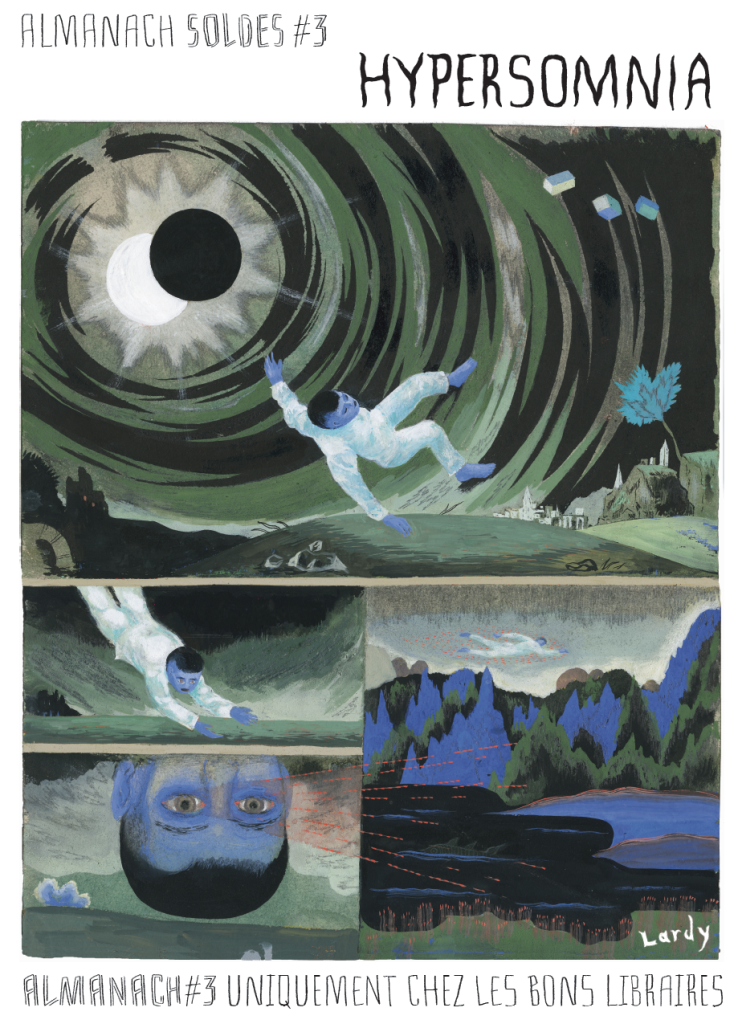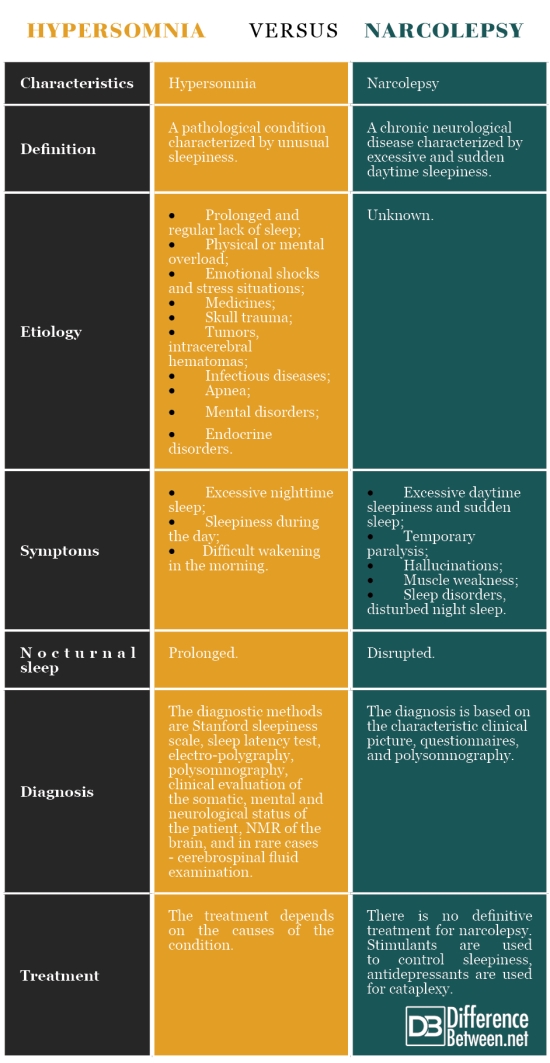Difference Between Hypersomnia and Narcolepsy
What is Hypersomnia?
Hypersomnia is a pathological condition characterized by unusual sleepiness. It can develop as a complication of the course of many diseases, most often diseases of the nervous system.
The main reasons for hypersomnia are:
- Prolonged and regular lack of sleep;
- Physical overload, mental overload;
- Emotional shock and stress situations;
- Medicines;
- Skull trauma;
- Tumors, intracerebral hematomas;
- Infectious diseases (meningitis, encephalitis, syphilis);
- Apnea and accompanying brain tissue hypoxia;
- Mental disorders;
- Endocrine disorders.

Some types of hypersomnia have an unknown etiology.
The main symptoms of the disease are excessive nighttime sleep (about 14 hours) and sleepiness during the day. Other characteristic signs are a difficult wakening in the morning, even with an alarm clock. In hypersomnia, the patient needs a long period to wake up.
This condition affects efficiency, attention, concentration, and greatly reduces working capacity. Even sleep during the day usually does not relieve the patient.
The diagnostic methods are:
- Special tests (Stanford sleepiness scale, sleep latency test);
- Electro-polygraphy or polysomnography of waking and night sleep;
- Clinical evaluation of the somatic, mental and neurological status of the patient;
- NMR of the brain;
- Cerebrospinal fluid examination.
The differential diagnosis method is also used to exclude asthenia, chronic fatigue syndrome and other functional disorders with similar symptoms.
There are several types of hypersomnia:
- Idiopathic hypersomnia;
- Pathological hypersomnia;
- Narcolepsy;
- Post-traumatic hypersomnia;
- Drug hypersomnia;
- Klein-Levin syndrome;
In order to undertake adequate treatment of hypersomnia, it is important to determine the causes of the condition and to eliminate them. If it develops as an independent neuropsychiatric disorder, it should be treated medically and by regulating the patient’s sleep habits and diet.
What is Narcolepsy?
Narcolepsy is a chronic neurological disease characterized by excessive daytime sleepiness. The patients are unable to control the wakefulness and sudden sleep, regardless of circumstances and environment. It usually starts in childhood, but a clear clinic is expressed later.
Sleep can occur at any moment – while doing the usual day-to-day work at home or at work, even in hazardous circumstances such as driving and operating machinery. It only lasts a few minutes, with different frequencies during the day. Work and concentration are usually violated.

Other symptoms of narcolepsy are:
- Temporary muscle paralysis when awakening;
- Sleep or awakening causes hallucinations;
- Sudden muscle weakness lasting seconds to several minutes;
- Higher incidence of sleep disorders, such as insomnia, sleep apnea, restless legs syndrome, etc.;
- Disturbed night sleep.
The cause of narcolepsy is unknown. Single inheritance cases are described, but there is often no occurrence in the family. Studies of individuals suffering from narcolepsy show very low levels of the neurotransmitter hypocretin. Hypocretin is considered to be involved in the sleep control at a hypothalamus level.
The diagnosis of narcolepsy is based on the characteristic clinical picture and some studies. Questionnaires are developed in an attempt to objectify the sleepiness during the day.
Of great importance is the analysis of the sleep through polysomnography. It monitors the cardiac function, biological activity of the brain, muscle tone, eye movements, and respiratory movements. The time necessary to fall asleep during the day in a lying position with a suitable atmosphere is also recorded.
There is no definitive treatment for narcolepsy. Stimulants are used to control sleepiness and stimulate performance. Antidepressants are used for cataplexy. Regular sleep at night is recommended – at a specific time intervals, as well as breaks during the day.
Difference Between Hypersomnia and Narcolepsy
Definition
Hypersomnia: Hypersomnia is a pathological condition characterized by unusual sleepiness.
Narcolepsy: Narcolepsy is a chronic neurological disease characterized by excessive and sudden daytime sleepiness.
Etiology
Hypersomnia: The main reasons for hypersomnia are prolonged and regular lack of sleep, physical or mental overload, emotional shocks, stress situations, medicines, skull trauma, tumors, intracerebral hematomas, infectious diseases, apnea, mental disorders, endocrine disorders.
Narcolepsy: The narcolepsy is with unknown etiology. Single inheritance cases are described, but there is often no occurrence in the family.
Symptoms
Hypersomnia: The main symptoms of hypersomnia are excessive nighttime sleep, sleepiness during the day, difficult wakening in the morning.
Narcolepsy: The main symptoms of narcolepsy are excessive daytime sleepiness and sudden sleep. Other symptoms are temporary paralysis, hallucinations, muscle weakness, sleep disorders, disturbed night sleep.
Nocturnal sleep
Hypersomnia: Nocturnal sleep is prolonged in hypersomnia.
Narcolepsy: Nocturnal sleep is typically disrupted in narcolepsy.
Diagnosis
Hypersomnia: The diagnostic methods of hypersomnia are Stanford sleepiness scale, sleep latency test, electro-polygraphy, polysomnography, clinical evaluation of the somatic, mental and neurological status of the patient, NMR of the brain, and in rare cases – cerebrospinal fluid examination.
Narcolepsy: The diagnosis of narcolepsy is based on the characteristic clinical picture, questionnaires, and polysomnography.
Treatment
Hypersomnia: The treatment of hypersomnia depends on the causes of the condition. If it develops as an independent neuropsychiatric disorder, it is treated medically and by regulating the patient’s sleep habits and diet.
Narcolepsy: There is no definitive treatment for narcolepsy. Stimulants are used to control sleepiness, antidepressants are used for cataplexy. Regular sleep at night is recommended.
Hypersomnia Vs. Narcolepsy : Comparison Chart

Summary of Hypersomnia Vs. Narcolepsy
- Hypersomnia is a pathological condition characterized by unusual sleepiness.
- Narcolepsy is a chronic neurological disease characterized by excessive and sudden daytime sleepiness.
- The main reasons for hypersomnia are prolonged and regular lack of sleep, physical or mental overload, emotional shocks and stress situations, medicines, skull trauma, tumors, intracerebral hematomas, infectious diseases, apnea, mental disorders, endocrine disorders. The narcolepsy is with unknown etiology.
- The main symptoms of hypersomnia are excessive nighttime sleep, sleepiness during the day, difficult wakening in the morning. The main symptoms of narcolepsy are excessive daytime sleepiness and sudden sleep.
- Nocturnal sleep is prolonged in hypersomnia, while in narcolepsy it is typically disrupted.
- The diagnostic methods of hypersomnia are Stanford sleepiness scale, sleep latency test, electro-polygraphy or polysomnography, clinical evaluation of the somatic, mental and neurological status, NMR of the brain. The diagnosis of narcolepsy is based on the characteristic clinical picture, questionnaires, and polysomnography.
- Difference Between Gallstones and Cholecystitis - September 5, 2021
- Difference Between Constipation and Cramping - August 4, 2021
- Difference Between Whole Genome Sequencing and Microarray - May 6, 2021
Search DifferenceBetween.net :
1 Comment
Leave a Response
References :
[0]Hirshkowitz, M., P. Smith, W. Dement. Sleep Disorders for Dummies. Hoboken: Wiley Publishing Inc. 2004. Print.
[1]Morin, Ch., C. Espie (Eds.). The Oxford Handbook of Sleep and Sleep Disorders. Oxford: Oxford University Press Inc. 2012. Print.
[2]Roth, B. Narcolepsy and Hypersomnia. Basel: Karger. 1981. Print.
[3]Image credit: https://upload.wikimedia.org/wikipedia/commons/a/a6/Narcoleptic_Minute_006_0001.jpg
[4]Image credit: https://upload.wikimedia.org/wikipedia/commons/2/23/Lardy_HYPERSOMNIA_-_Almanach_Soldes_magazine.png

Thank you for your excellent article. It gave explanation for questions
I have had and enforced some of my own observations.
I was diagnosed in Nov. of 1997 with narcolepsy. Thru many questions from my physician
I was able to describe many situations growing up that “cataplexy attacks” explained. And the first narcolepsy episode was my sophomore year in college. I awoke sitting two feet from the professor having no idea how long I had been asleep. This did not cause alarm…I was a college student burning the candle at both ends. The sleepiness continued thru marriage [1967] and two children. It was my very sharpe OBGYN that requested a sleep study at Presbyterian Hosp. in Dallas, TX that I was diagnosed for both cataplexy and narcolepsy. Then in August of 2019 after another sleep study I was diagnosed with sleep apnea.
Questions: 1. How do these relate…the narcolepsy and sleep apnea?
2. My father died with Alzehimers and my mother died with Lewy Bodies Disease. With my medical history do I have a greater chance of developing
either due to my parents history?
Thank you for your kind attention and thought to my questions.
Priscilla G. Farr